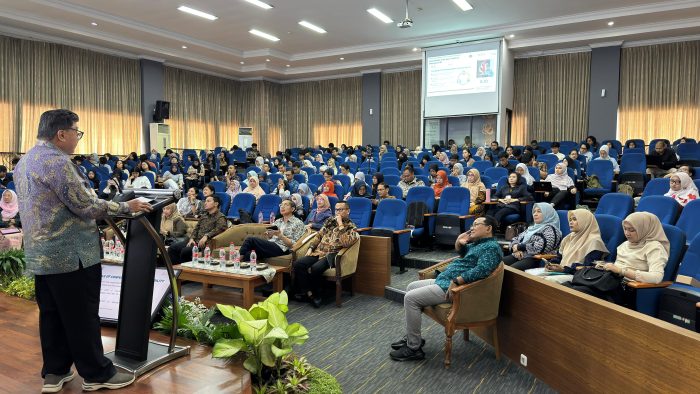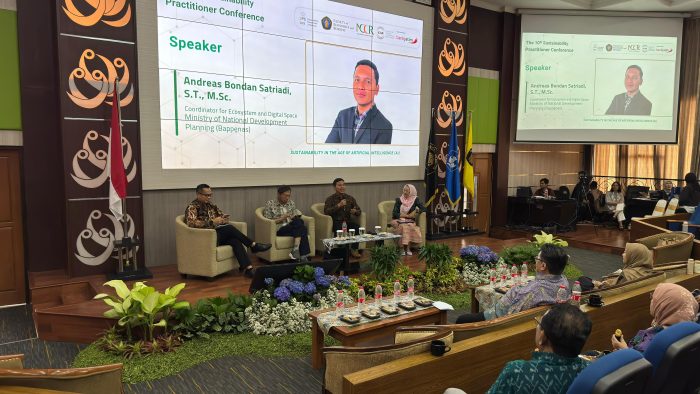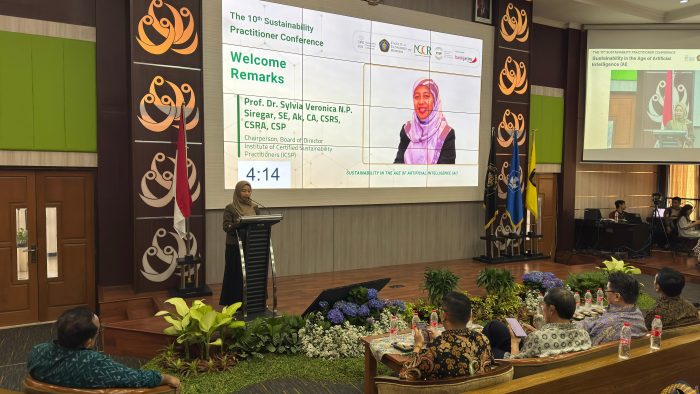Press Release
MALANG– With the theme “Sustainability in the Age of Artificial Intelligence (AI)”, the Institute of Certified Sustainability Practitioners (ICSP), in collaboration with the National Center for Corporate Reporting (NCCR), once again held its annual event, the Sustainability Practitioner Conference (SPC). Marking its 10th year, SPC 2025 was held in Malang, East Java, in collaboration with the Faculty of Economics and Business (FEB), Universitas Brawijaya (Thursday, 23/10/2025). Through panel discussions, participants were invited to explore strategic approaches to utilizing digital technologies, particularly Artificial Intelligence (AI), to achieve a balance between innovation, efficiency, and socio-environmental responsibility.
The Executive Director of the National Center for Corporate Reporting (NCCR), Ali Darwin, elaborated on the fundamental concept of sustainability and its connection to the advancement of digital technology. He explained that the function of AI has evolved from being merely a tool for efficiency to becoming an active solution for addressing economic, environmental, and social challenges.
“With its capability to process billions of data points from around the world, AI helps us identify the most efficient ways to conserve energy and reduce carbon footprints. Beyond that, AI can project future climate scenarios and anticipate risks before disasters actually occur. This gives us the opportunity to act before it is too late,” said Ali.
Ali Darwin mentioned that digital transformation and artificial intelligence have now become two major forces shaping the future of the global economy. However, such progress must be balanced with ethical, social, and ecological responsibility.
“Technology is only as good as the values that guide it. Through a sustainable approach, AI can serve as a driving force for the green economy and more equitable development,” he added.
Technology serves not only as an instrument for growth, but also as a vehicle for shaping an inclusive and sustainable future. During the panel discussion, the government also expressed a similar perspective.
Coordinator for Digital Ecosystem and Space, Ministry of National Development Planning/Bappenas, Andreas Bondan Satriadi stated that the adoption of Artificial Intelligence (AI) in Indonesia’s economic transformation is projected to contribute a potential value of USD 366 billion to the country’s GDP by 2030.
“The potential for economic growth through the utilization of technology indicates that AI and emerging technologies are no longer just future-oriented concepts, but have become an integral component of Indonesia’s strategy to boost national economic growth to 8 percent by 2029,” stated Andreas.
Therefore, Indonesia needs to continuously adapt to the rapid development of digital technology. Andreas explained that Indonesia’s AI regulations have been institutionalized through the National Artificial Intelligence Strategy 2020–2045 and the Ministerial Circular No. 9/2023 on Artificial Intelligence Ethics, issued by the Ministry of Communication and Information Technology. Following these two policies, the government is currently formulating the Indonesia Artificial Intelligence Roadmap.
During the same session, Head of the Smart City and Community Innovation Center, Bandung Institute of Technology (ITB), Prof. Suhono Harso Supangkat, M.Eng, elaborated on how AI can actually be utilized to advance sustainability at the regional level. By implementing smart city initiatives, AI enables the evolution of urban environments into cognitive cities.
“While a smart city focuses on leveraging technology to enhance the efficiency of public services, a cognitive city goes a step further. A cognitive city does not rely solely on automation but also employs AI to adapt, learn, and make decisions dynamically,” said Suhono.
On the other hand, the advancement of digital technology also brings significant benefits to the industrial sector. Senior Vice President of Business and Service Delivery at PT Sinergi Informatika Semen Indonesia, Fachlul Infithar, S.E., M.T.I., emphasized that the application of AI is crucial for sustainable business transformation.
Fachlul explained that AI can contribute to sustainability by implementing four core elements. First, enhancing energy efficiency and process optimization. Second, predicting emissions and resource consumption. Third, optimizing supply chains, and four, leveraging data to strengthen decision-making processes.
In the conference attended by hundreds of participants from diverse backgrounds, Chair of the Board of the Institute of Certified Sustainability Practitioners (ICSP), Prof. Dr. Sylvia Veronica N.P. Siregar, S.E., Ak., C.A., CSRS, CSRA, CSP, pointed out that the use of AI presents opportunities for all stakeholders to contribute to achieving the targets of the Sustainable Development Goals (SDGs).
“Indeed, AI has already started to reshape the landscape of sustainability. This technology enables us to forecast energy demands, monitor emissions in real time, optimize supply chains, and analyze environmental and social data on an unprecedented scale. AI supports businesses in anticipating climate risks, empowers governments to formulate smarter policies, and drives research that yields meaningful results,” said Sylvia.
AI stands as tangible evidence that technology can serve as a key partner in advancing Indonesia’s sustainability transformation. Beyond tangible outcomes, sustainability is a long-term process toward meaningful change-achievable through innovation and collaboration. This message was conveyed by ICSP, NCCR, FEB Universitas Brawijaya, and all the speakers through the convening of the 10th Sustainability Practitioner Conference (SPC) 2025, supported by PT Bank Pembangunan Daerah Jawa Timur Tbk (Bank Jatim).
Access/Download the full press release in Indonesian and English here.
About the Event Organizer
- Universitas Brawijaya (UB)is one of Indonesia’s leading universities, actively promoting the advancement of science, technology, and innovation based on the principles of sustainability. Located in Malang, East Java, UB has initiated various programs such as the Green Campus initiative, research under the Center for Environmental Studies (PSLH), and numerous innovation projects aligned with the Sustainable Development Goals (SDGs). UB continuously develops solutions to environmental, social, and economic challenges.
- The Institute of Certified Sustainability Practitioners (ICSP) is a Jakarta-based professional association that brings together sustainability practitioners to strengthen competencies and advance the application of sustainability practices across diverse sectors. ICSP also administers two professional certifications: CSRS (Certified Sustainability Reporting Specialist) and CSRA (Certified Sustainability Reporting Assurer).
- The National Center for Corporate Reporting (NCCR), formerly known as the National Center for Sustainability Reporting (NCSR), is the first organization in Indonesia to introduce sustainability reporting and to promote its adoption by corporations and institutions. As the official partner of the Global Reporting Initiative (GRI) in Indonesia, NCCR focuses on developing individual competencies in sustainability report preparation.
Categorised in Press Release. Submitted by ICSP Editor



